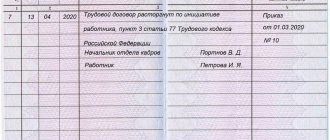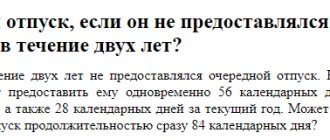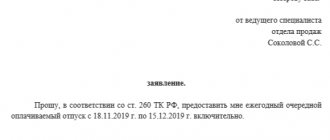Compensation
Every officially employed citizen has the right to paid leave. To obtain it you must work for 11 months. It is also allowed to take half of the vacation six months after employment. The standard duration of leave is 28 days, but additional days off may be provided.
A subordinate may not use all of his vacation in a year. By law, when dividing this period, the duration of one of the parts must be at least 14 days. And upon dismissal, the employer is obliged to compensate the subordinate for unused days off. Payment is made on the employee's last working day.
To calculate holiday pay, the employer uses the person's average daily earnings. The calculation period must be 12 months.
The person’s entire salary for this period, as well as various bonuses and additional payments, are divided by 12. The result obtained must be divided by 29.4.
Articles on the topic (click to view)
- Fine for late payment of vacation pay
- What to do with unused vacation
- What to do if your employer does not pay vacation pay
- How long after employment is vacation allowed?
- Is maternity leave taken into account when calculating pensions?
- Accounting for compensation for unused vacation
- Dismissal while on maternity leave
This is the average number of days in a month specially established for such calculations.
When determining compensation, the following types of income are not taken into account:
- sick pay;
- periods of downtime due to the fault of the manager;
- payment for stay on a business trip.
That is, periods when the subordinate maintained average earnings are not taken into account. Also not taken into account:
- time off at your own expense (their total number cannot exceed 14 days per year);
- days that the subordinate missed without a good reason;
- decree.
Once the daily wage has been determined, this number must be multiplied by the number of days that were not used by the person as vacation. For example, a subordinate’s income for the year is 340 thousand rubles. According to the standard formula: 340,000/12/29.4 = 963 rubles. This is the average income of a subordinate per day. Let's say he has 12 days of vacation left: 963*12 = 11,556 rubles.
An employer can compensate for days off not only upon dismissal. But this is not always possible:
- Only additional days are subject to payment. For example, an employee receives 28 days of vacation and on top of that another 6 days additionally (for difficult working conditions, etc.). The organization can pay for these 6 days, but the subordinate will have to take the rest of the vacation.
- Additional days are not paid for pregnant women and minor subordinates. They can only receive money upon dismissal.
As for the calculation, it is carried out in the same way as for paying compensation during the dismissal of a subordinate. That is, the average wage per day is determined, and its value is multiplied by the number of days off. To receive payment, a subordinate must write a corresponding application.
The document is drawn up in any form with a mandatory indication of the number of days of additional rest to be paid. Based on it, the boss draws up an order, which is necessary to carry out the calculation. The employee must receive the money during the payment of salary or advance payment.
Calculation of compensation payments
Persons who are officially employed are required to receive paid leave. To apply for it, an 11-month work period is required, but an employee can apply for half of the required rest after six months of work. According to standards, vacation is provided in the amount of 28 days, but some enterprises provide their employees with additional days for harmful working conditions and other stress. But what is more profitable - vacation or compensation upon dismissal - is up to the employee to decide.
The subordinate does not have to take out a whole vacation. The legislation provides for partial division of vacation days. Moreover, each part of the vacation should not be less than 14 days. In case of dismissal, the employer must pay the employee compensation for unused rest days. Payment must be made no later than the employee’s last working day at the enterprise.
The compensation payment is calculated based on the average daily earnings of the subordinate.
The billing period is calculated based on the calendar year. All earned monetary resources received by the employee must be divided by 12. The amount received is divided by a coefficient of 29.4, which means the average number of days in a calendar month.
When calculating the amount of compensation payment, not all of the employee’s income is taken into account. The following types of profit received are not taken into account:
- sick leave payments;
- downtime due to the fault of management;
- travel allowances.
Some periods are also not included in the compensation payment. The following are not taken into account:
- time off taken at your own expense;
- absenteeism without good reason;
- going on maternity leave.
After determining the daily wage, this amount is multiplied by the number of days that the employee did not use for rest.
For example, if a worker’s annual income is 340,000 rubles, the calculation is carried out according to the formula: 340,000 / 12 (months per year) / 29.4 (coefficient). The total is 963 rubles. This means average daily income. If an employee has 12 calendar vacation days left, then 963 is multiplied by 12, which totals 11,556 rubles.
Compensation can be made by the employer not only in case of dismissal of the employee. This is not always justified, but there are some exceptions:
- Payment can only be accrued for additional vacation days. For example, if an employee has 28 days of basic leave and 6 additional days for harmful working conditions, then the organization has the right to issue compensation for only 6 days, and the employee will have to take the rest of the days off.
- Pregnant women and minor citizens lose the right to compensation for additional days. In this case, reimbursement of funds is possible only in the event of dismissal of the employee.
Estimated payments are calculated in the same way as compensation payments for unused vacation days. Before receiving this money, the employee must write a letter of resignation. Funds are credited to the employee’s account during the period the company makes wage payments.
Vacation pay calculation
When leaving work, a subordinate has the right to use his paid leave. Some take days off in lieu of the required work. This is permitted by law, so there should be no problems with registration. But it should be remembered that replacing work with weekends is possible only with the permission of the employer.
If the employee does use vacation, the employer is obliged to pay vacation pay. This amount is provided to employees as incentives. The question of what is more profitable, vacation pay or compensation, worries many. Therefore, it is important to know how the required payments are calculated.
This is important to know: Postponement of leave due to family circumstances
To do this, the employer must also calculate the person’s average daily earnings, and then multiply the resulting amount by the number of days off. That is, there is no difference in the calculations. And if you take an employee with a salary of 340 thousand rubles per year, then both vacation pay and compensation for him will be the same.
In order for a manager to provide an employee who decides to quit with vacation or money, his request must be formulated correctly. To do this, you need to draw up a letter of resignation, indicating how the days off should be spent. The employer does not have the right to decide this issue instead of the employee.
Help: if a subordinate has requested vacation pay, that is, he is going to use his legal days off, then the application must be submitted no less than 14 days before going on vacation. Then the employer will be able to carry out all the calculations. Payment is made 3 days before departure to the employee’s bank card or in cash at the cash desk.
Compensation for unused vacation or vacation pay - which is greater? The answer to this question is very simple - employers use the same formula for calculation, so there is no difference. And the choice must be made by the employee, going on vacation or demanding legal payments.
Who can receive monetary compensation?
An employee can receive compensation for vacation in two cases:
All payments to the employee must be made on the day of dismissal. But sometimes it happens that, in agreement with management, an employee, after 6 months of work, takes a 28-day rest. Accordingly, if he decides to quit in the near future, part of the vacation will be spent in advance.
Therefore, the employer has the right to withhold compensation for extra days. By law, this amount should not exceed 20% of the salary paid to the employee upon dismissal. The second case is related to the fact that, according to the Labor Code of the Russian Federation, certain categories of workers have the right to extended leave.
However, under no circumstances is it allowed to replace vacation with money:
It should be noted that study leave also cannot be replaced with payment.
Rules for calculating and calculating compensation for unused vacation upon dismissal
- compensation is calculated immediately before payment;
- The period worked by the employee is taken into account. In the event that an employee has not fully worked the temporary period, vacation days are accrued depending on the working months themselves; if the employee worked more than 2 weeks in one month, this is rounded up to exactly 1 calendar month.
Please note => Blank MTPL insurance policy form with stamp
First of all, it is necessary to understand that the Labor Code of the Russian Federation does not have a clear procedure for determining the number of vacation days. But at the same time, when calculating the days of unused vacation, it is necessary to pay attention to Article No. 423 of the Labor Code of the Russian Federation, which states: monetary compensation is paid in proportion to the days of unused vacation.
Are vacation pay different from compensation?
Before determining what the difference is between vacation pay and compensation for unused vacation, you need to understand these concepts. Providing a working citizen with an annual 28-day rest from work is the responsibility of the manager, enshrined in the labor legislation of the Russian Federation.
Vacation pay is payment for the employee's next vacation. Upon dismissal, each employee must receive compensation for all unused days of basic and additional leave (Article 127 of the Labor Code of the Russian Federation). In this case, the reason for dismissal does not matter, and the working year begins from the date of employment.
The amount of both vacation pay and compensation for unused days depends on the following indicators:
- average daily earnings for the billing period;
- duration of rest.
To determine the average daily earnings you need:
- divide the amount of accruals for the last year by 12;
- divide the resulting number by 29.3 - the generally accepted average number of days in a month.
Next, the found average daily earnings are multiplied by the number of unused rest days.
Compensation for unused vacation without dismissal
- Illness of an employee during rest. This circumstance must be documented through a sick leave certificate, which means an official application to the medical service will be required. institution.
- If the vacation time coincides with the employee’s performance of any government duties, for the fulfillment of which, according to the law, the employer is obliged to release him from work.
- In other cases provided by law.
Labor legislation guarantees a standard leave of 28 days. Representatives of some professions are entitled to longer rest; for example, teachers may not go to work for 45 or even 56 days. In addition, employees working under special conditions receive additional leave.
What is more profitable for the employee?
Employees often wonder what is more: vacation pay or compensation for unused vacation. The main indicator for calculating both payments is the average daily earnings for the last 12 months of work. Therefore, the amount of vacation pay will be equal to compensation for unused vacation.
When leaving a job, many people wonder which option is more profitable:
- work for two weeks and receive payment for unused vacation;
- go on paid leave and leave without working.
In the first case, the employee will be able to count on an amount exceeding the allotted amount; in the second, he will have more rest. When calculating the number of unused days, work experience is rounded to the nearest month. If less than half a month is worked, it is not taken into account. Thus, having worked 7.5 months, a citizen will receive payment for 8 months of work.
Expert opinion
Novikov Oleg Tarasovich
Legal consultant with 7 years of experience. Specializes in criminal law. Member of the Bar Association.
Some employers pay part of the salary unofficially. In such a situation, it is worth remembering that all payments and compensation will be calculated based on “white” income.
This is important to know: Are days off on vacation paid?
Trying to find a more profitable option when leaving, employees choose between paid rest and compensation for unpaid vacation. But these payments are calculated in one way - based on average daily earnings.
Determining the Difference
When thinking about benefits, you should remember that every employee needs rest. Therefore, taking leave is always preferable to receiving compensation.
According to the Labor Code of the Russian Federation, each employee has the right to take annual paid leave of 28 calendar days. Vacation is calculated using the formula 28:12 = 2.33 vacation days. An employee can go on vacation after 11 months of work, and while on vacation, he earns another 2.33 vacation days. It turns out that after working for 11 months, an employee receives the right to rest for a 12-month period of work.
If a working colleague decided upon dismissal to limit himself only to compensation for unprovided rest, having worked for a whole calendar year, then he has the right only to calculate the payment based on 28 days, nothing more. In this case, 2.33 days are lost.
If we are talking about which is more - vacation pay or compensation for unused vacation, it is worth remembering the loss of 2.33 days of annual leave when choosing compensation. For example, if an employee worked at an enterprise for 3 years without rest, and his salary was 60,000 rubles, then for the entire period he lost 15,000 rubles.
Without going on vacation
The option concerns an employee who has not taken a single vacation day for 3 years. The salary was 60,000 rubles. The calculation was:
- 60,000 * 36 = 2,160,000 rub.
- Upon dismissal, compensation is due for 28 * 3 = 84 days.
- 60,000: 28 x 84 = 180,000 rub.
- Calculation of total earnings for 36 months. is: 2160000 + 180000.00 = 2340000 rub.
So, the average monthly salary will be 2,340,000: 36 = 65,000 rubles.
Happy annual holiday
The calculation of the second option provides for the moment when the employee annually took his allotted rest. The vacation was 28 calendar days. They must be subtracted from the number of months that have already been worked, since these days were weekends. So it turns out:
- 36−3 = 33 months
- During these months, 60,000 rubles were received. * 33 = 1,980,000 rub.
- Compensation for 3 months will be 60,000 * 3 = 180,000 rubles.
- The total amount of funds earned for 33 months will be as follows: 1,980,000 + 180,000 = 2,160,000 rubles.
The amount of average monthly earnings will be 2,160,000: 33 = 65,454.55. The difference between these two calculation options is:
- (65454.55 - 65000) = 454.55 * 11 * 3 = 15,000 rubles.
According to the examples given, one can clearly assume that upon dismissal it is still better to take out the rest of the leave than to receive compensation.
The employee must understand that he can use this right only with the permission of the head of the enterprise. If the employer refuses in this matter, you will have to agree to compensation.
No money? - Go on vacation!
The issue of personal finance accounting is more relevant today than ever. Some limit themselves to approximate cost calculations, while others use special programs for planning a personal or family budget. But one thing can be said for sure about everyone - every year society becomes more literate and the desire to keep abreast of lost profits, so as not to regret lost profits, increases exponentially.
We constantly calculate how much we earn and how much we spend. How much we save and how much we lose in certain situations. But few people know that you can “earn” and “lose” even on such a banal thing as a vacation. How is this possible? For example, instead of going on vacation, you decided to take monetary compensation for not using it. You can motivate this in any way you like - high employment, lack of funds, an all-consuming desire to save money.
But in fact, if you really went for it, you made two serious mistakes at once. The first is obvious, and you yourself are well aware of it - by refusing to rest, you deprived your body of the opportunity to regain strength and, as a result, significantly reduced your efficiency for the next year. The second mistake is not so obvious, but no less serious. It turns out that by refusing your legally entitled vacation, you lost another 2.33 days of freedom!
The fact is that, according to Article 121 of the Labor Code of the Russian Federation, the length of service giving the right to annual paid leave includes not only the time of actual work, but also the time when the employee did not actually work, but retained his place of work, including, This is the time of annual paid leave. What does this mean in practice?
Per year, an employee is entitled to 28 calendar days of annual paid leave, respectively, this is 28 / 12 = 2.33 days of paid leave every month, regardless of whether you are actually working or on vacation. Then, after working for 11 months and earning 2.33 x 11 = 25.63 days, you can go on vacation. During your vacation, you will earn an additional 2.33 days of paid vacation time. And, as a result, at the end of the year you will have a year’s experience in your piggy bank, giving you the right to a vacation of 25.63 + 2.33 = 28 days. So, in fact, after working only 11 months, you receive the vacation due for 12 months of work.
Now the second situation is when you do not take vacation, but are limited to monetary compensation, and work for 12 months. According to the same article 121 of the Labor Code of the Russian Federation, you are entitled to 28 days of vacation (no more!), and 2.33 days of them, unlike rested colleagues, you receive not during rest, but during work.
Receiving compensation for unused vacation
Transferring vacation, even if it was done in violation of current legislation, does not threaten the employee himself. The only inconvenience is that after the relevant regulatory authorities identify such a violation, the employee will have to urgently go on vacation, even if he did not plan this. Other reasons for filing an application to transfer vacation days are also acceptable. Such situations are individual in nature and are subject to careful study. The employer himself has the right to make a decision to postpone vacation solely by agreement with the employee.
Did you know about such nuances of the labor code?
* The problem assumes that during your vacation your monthly salary is retained, and the average salary is not calculated according to accounting rules. By improving your financial literacy, you can increase your personal budget.
This is important to know: Application for early return to work after maternity leave: sample 2021
The relevance of this topic is undeniable. After all, the issue of financial literacy is often thought about not by those who have problems with money, but by people who have plenty of it. So, being savvy and flexible to modern conditions will give you self-confidence and make you more successful. Feel free to attend courses and seminars, and get information from financial media reviews.
Registration of vacation pay
Before dismissal from a position, an employee can exercise the right to his unused vacation. It is often practiced to take leave instead of the 2-week work required by law. This approach is legally permitted and therefore eliminates any difficulties. It is permissible to replace the work if the employer gives his permission.
In case of registration of vacation, the employer provides for payment of vacation pay. In order to decide what is more profitable - taking a vacation or receiving compensation upon dismissal, it is important to understand how such payments are calculated.
First, the employer calculates the average one-day earnings, after which the result is multiplied by the number of days that were days off. There shouldn't be any difference in the calculations. This means that both vacation pay and compensation are accrued in the same amounts.
The subordinate should remember that the resignation letter must be submitted 2 weeks before dismissal.
To correctly understand what is more profitable - vacation followed by dismissal or compensation, you need to take into account that the calculation is made using the same formula, so there is no difference. The choice is up to each employee - to go on vacation or receive a cash payment.









